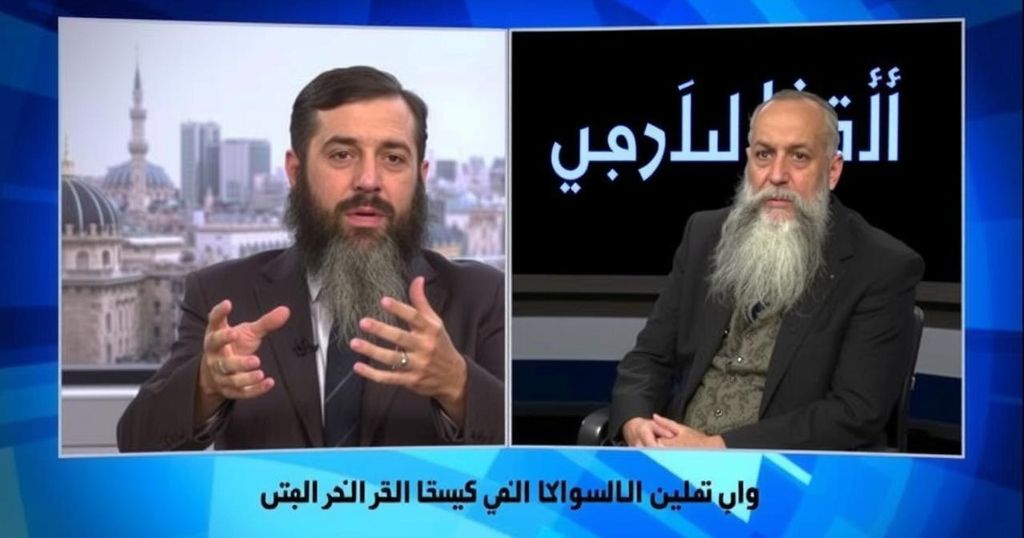Julani Urges Reconstruction and Stability for Syria, Rejects Foreign Intervention

Ahmad al-Julani, leader of Hayat Tahrir al-Sham, declared that Israel has no justification for intervention in Syria post-Iranian withdrawal. He stressed the need for reconstruction, stability, and respect for Syrian sovereignty, while denouncing the Assad regime’s exploitation of the populace. Julani promised to end captagon production and protect minority communities, aiming to transition Syria from a revolutionary mindset to a state-focused governance.
In a significant television interview with the opposition channel Syria.tv, Ahmad “Abu Mohammad al-Julani” al-Sharaa, the commander of Hayat Tahrir al-Sham (HTS), articulated his vision for Syria and its international standing. Emphasizing that Israel has “no more justifications for any foreign intervention in Syria” following the withdrawal of Iranian forces, Julani underscored the need for Syrian sovereignty and cautioned against any escalation in conflicts. His focus on reconstruction aims to avoid further destruction and promotes stability in a war-torn nation.
Julani called upon the global community to assist in maintaining peace and preventing any military escapades that could destabilize Syria further. He denounced the Iranian regime’s transformation of Syria into a launchpad for attacks, yet he affirmed that they do not harbor animosity toward the Iranian populace, stating, “Our problem was with the policies that harmed our country.” Furthermore, he indicated the need to reassess the relationship with Russia, recognizing the devastating role of the Russian airstrikes during the civil war while also hinting at a cooperative path forward.
Acknowledging the shift from a revolutionary mentality to one of governance, Julani stated that the Syrian revolution has succeeded but must now transition towards establishing laws and institutional frameworks necessary for rebuilding the country. He criticized the Assad regime, asserting that it had “systematically” plundered Syria and constructed a mismanaged feudal system of taxation to exploit its citizens’ wealth.
In light of building a more stable and prosperous Syria, Julani pledged to eradicate the production of captagon, a drug that thrived under the Assad regime and has led to Syria being labeled as a narco-state. He has reaffirmed commitments to protect Syria’s minority communities, specifically the Christian and Druze populations who opposed Assad. Lastly, Julani noted the intention to integrate various armed factions under a centralized authority, marking a pivotal moment in the reformation of Syria’s governance and security apparatus.
The interview conducted with Ahmad al-Julani marks a pivotal moment in the narrative of the Syrian civil war and its aftermath. As a prominent rebel leader, his statements offer insights into the evolving dynamics in Syria, particularly regarding foreign interventions and internal governance structures. His focus on the future of Syria post-conflict, with an emphasis on reconstruction and stability, reflects a shift in priorities from outright military confrontation to state-building and regulation of societal issues. Julani’s comments also highlight the complexities of international relations in the region, where historical grievances and current geopolitical realities are intertwined.
In summary, Ahmad “Abu Mohammad al-Julani” al-Sharaa’s interview elucidates a transformative perspective on Syria’s future. Acknowledging the end of Iranian intervention and calling for a cessation of foreign involvement, he advocates for national sovereignty and the establishment of a governance framework aimed at reconstruction. His commitment to safeguarding minority rights and dismantling the captagon trade signifies a proactive approach toward addressing the societal issues that have plagued Syria during the war. Julani’s vision reflects an aspiration for stability, law, and institutional development in a country deeply affected by conflict.
Original Source: www.jpost.com






